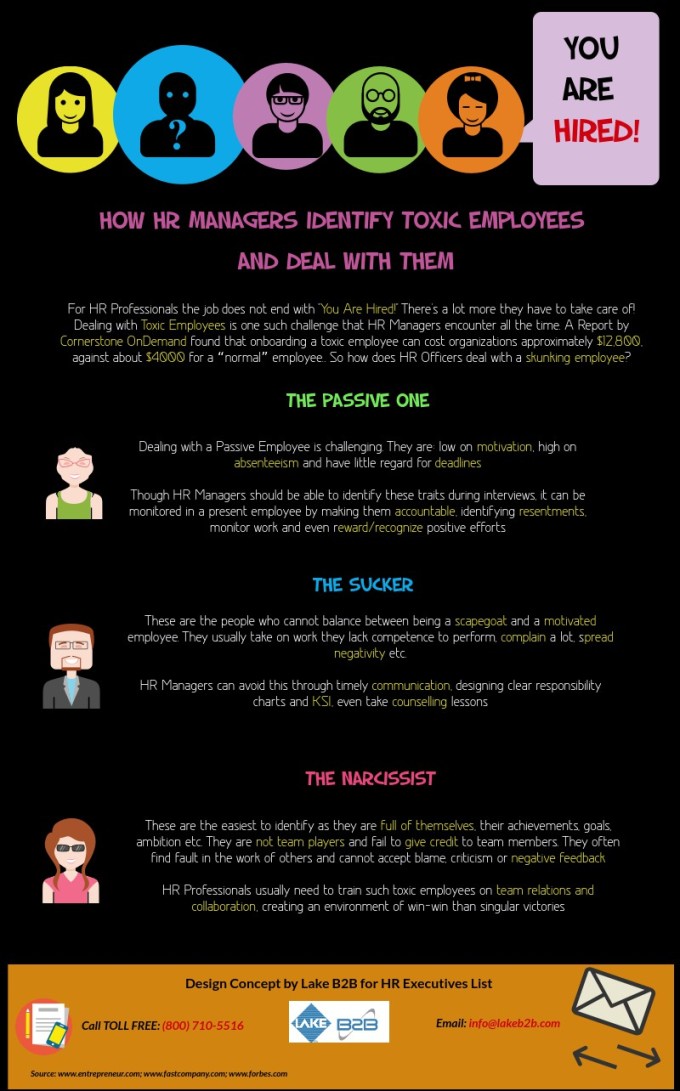As a marketing executive, I keep meeting new people in my professional sphere. From individuals in C-Suite roles to those in Managerial positions – the spectrum of people I encounter has been diverse and extensive. While I get to learn-unlearn-relearn many things from each encounter, the one common thing I have heard all of them talk about is the challenge of dealing with difficult employees. Dealing with employees who do not perform well, or fail to get along with other team members, or do not adhere to organization policies and rules, seem to be inevitable for a manager. But all the more for HR Managers and professionals, who have to probably deal with such situations on a daily basis! The term “toxic employee” is what they are commonly termed as – not only because they demonstrate toxic behavior, but can often influence other employees into thinking and behaving like them as well. For HR Managers therefore, it is not only necessary to keep such toxic employees in check but also ensure that they do not spread the negative vibe around them.
HR Professionals often demonstrate certain key characteristics that help them to deal with difficult employees (You may be interested in knowing about the 5 Qualities HR Professionals should have). They understand the thin line of difference between accommodating difficult employees and actually falling prey to their behavior. While it is necessary for Human Resources as a team to work out an actionable plan to curb employee toxic behavior, there are times when they have to draw the strings really tight! So let’s have a look at 5 ways in which HR professionals manage difficult employees.
Intervene and Listen to the Problem
Communication forms the core of all remedies, and however negative an employee is there is always a redeeming quality in them. It all begins with communication – something that is often sidelined. When an employee shows toxic behavior, the normal attitude is to ignore the person/problem as job/personal frustration or behavioral traits. Instead of pushing things aside, HR Officers should intervene and listen to the problem. There’s little prudence in allowing embers to give rise to a fire. For instance, if a team member shows behavioral traits of being a “Narcissist” it’s necessary to plan a corrective strategy for him/her. Based on specific traits, HR Managers may either identify projects where they can work individually or put them in environment where personal growth is directly linked to team success.
Research on the Problem
As HR Professionals it is not enough to simply intervene and listen to the problem – it is also required to conduct a personal level of research and probing. It is possible that the employee in question is unaware of his/her distinct trait and all that’s required is a little push and awareness. For instance, if an employee behaves like a “Victim” all the time, HR Managers first need to verify the information from other employees as well. They also need to talk to the employee personally to understand their perspective. It is possible that due to work load or even temperamental grudge one is behaving in a particular way.
Develop a Plan
Developing a Plan of Action forms an integral part of the entire process of dealing with a difficult employee considering that it will determine the final outcome for the employee. While developing a plan, HR Managers need to understand that they are looking at “difficult behavior” and not an individual person. The plan therefore should be directed at resolving the behavioral problem instead of taking it to a personal level. For instance, if an employee behaves like a “Ghost” being absent whenever he/she is needed the most, the plan should incorporate consequences of the behavior.
Provide Behavioral Feedback and set Consequences
The important thing that employees need to understand is that feedback is not necessarily negative. Good HR Managers know how to provide feedback in a positive manner. What behavioral feedback actually should outline is – (a) What are the clear indications of disruptive behavior; (b) How the behavior has affected the team and his/her own performance; (c) How can improvement be brought about. A feedback session should also list the consequences of inaction or further negative action – both mild and severe ones. It should ideally also include the presence of the Team Manger and other key team players.
Be Professional in your Approach and Document everything
HR Managers work as the face of the company –its rules and policies. So under no circumstances should they act beyond organization policies and processes. As HR Professionals one should be courageous and courteous, well informed and professional. While they should point out the behavioral changes expected, they should also not fail to compliment the employee on his/her achievements (if any). Also, the entire process of managing toxic employees should be documented. Not only because it provides specifics, but mainly because it sets examples as to how to deal with such employee behavior in the future as well.
Overall, it’s not easy to manage difficult employees. It is a skill/competence that develops and cultivates over time. As HR Managers, individuals probably have to nurture and grow it before others – considering that in their specific people-centric role they always have to deal and engage with the real human resources of the organizations!
We think you will like our Infographic on the How HR Officers deal with the Types of Toxic Employees

Written By: Alissa Caldwell for Lake B2B
About Lake B2B: A leading provider of technology, business and healthcare mailing lists, with industry presence for over 15 years. Connect with us at info@lakeb2b.com or Call Toll Free (800)710-5516 for global b2b data.
List Source: List of HR Executives
